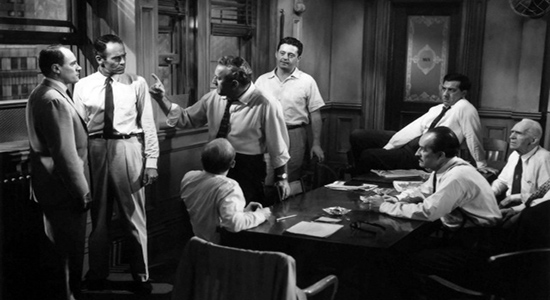MAGNET contributing writer Jud Cost is sharing some of the wealth of classic films he’s been lucky enough to see over the past 40 years. Trolling the backwaters of cinema, he has worked up a list of more than 500 titles—from the silent era through the ’90s—that you may have missed. A new selection, all currently available on DVD, appears every week.
12 Angry Men (1957, 96 minutes)
With a rainstorm about to hit New York City on a sweltering summer’s afternoon, a superior court judge instructs a jury of 12 men about their options. “Premeditated murder is the most serious charge tried in our criminal courts,” he intones. “You’ve heard the testimony, and it’s now your duty to separate the fact from the fancy. One man is dead and another man’s life is at stake. If there’s a reasonable doubt as to the guilt of the accused, you must bring me a verdict of not guilty. The death penalty,” warns the judge, “is mandatory in this case.”
After a bailiff leads the jurors to the room where they will determine the fate of the Latino defendant, juror number seven (Jack Warden) in a flashy snap-brim hat, expresses the hope they can get this over with soon. “I’ve got tickets to the ballgame tonight: the Yankees and Cleveland.” When silver-haired juror number nine (Joseph Sweeney) returns apologetically from the restroom, the foreman (Martin Balsam) announces, “We’d like to get started here.”
“It’s customary to take a preliminary vote,” says juror number four (E.G. Marshall), a stockbroker in wire-rim spectacles. The show of hands turns out to be 11 to one for a guilty verdict. The lone dissident is juror number eight (Henry Fonda) in a seersucker sports coat. “So, what do we do now?” asks Warden. “I guess we talk,” answers Fonda. “You really think he’s innocent?” asks juror number three (Lee J. Cobb). “I don’t know. He’s only 18 years old,” says Fonda. “Do you believe his story?” demands juror number 10 (Ed Begley). “I don’t know if I believe it. Maybe I don’t,” admits Fonda.
“So, how come you voted not guilty?” asks Warden. “There were 11 votes for guilty,” says Fonda. “It’s not easy for me to raise my hand and send a boy off to die without talking about it, first. We can’t decide in five minutes. Supposing we’re wrong. Look, this kid’s been kicked around all his life. Born in a slum. His mother died when he was nine. Lived in an orphanage for a year while his father was in jail.” Begley retorts, “I’ve lived with these people all my life. They’re born liars!” Sweeney stands up and says, “Only an ignorant man can believe that! Were you born with a monopoly on the truth?”
Fonda walks slowly to the end of the jury table and rolls the dice: “I have a proposition for you. Call for another vote by secret ballot. I’ll abstain. If there are 11 votes for guilty, I won’t stand alone. We’ll take a guilty verdict in to the judge, right now. But if anyone votes not guilty, we’ll stay and talk about it.” As Balsam begins to tally the votes, all eyes are fixed upon him.














